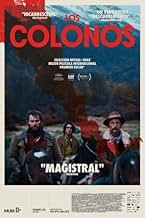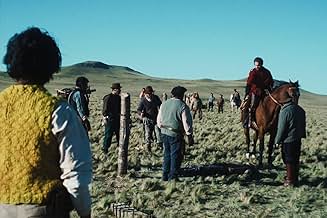ÉVALUATION IMDb
6,9/10
6,1 k
MA NOTE
Ajouter une intrigue dans votre langueIn Chile in 1901, three horseman are paid to protect a vast estate. Accompanying a British soldier and an American mercenary is a mixed-race sniper, who realizes that his true mission is to ... Tout lireIn Chile in 1901, three horseman are paid to protect a vast estate. Accompanying a British soldier and an American mercenary is a mixed-race sniper, who realizes that his true mission is to kill the indigenous population.In Chile in 1901, three horseman are paid to protect a vast estate. Accompanying a British soldier and an American mercenary is a mixed-race sniper, who realizes that his true mission is to kill the indigenous population.
- Director
- Writers
- Stars
- Prix
- 17 victoires et 27 nominations au total
Mishell Guaña
- Kiepja
- (as Mishell Guaña Montoya)
Avis en vedette
This revisionist western from Chile is a bleak and alarming tale which is based on the very real racism of colonialism, which targeted the indigenous people of that area circa 1900. The story is pretty simple and has a land baron send three men to clear the way for him, an ex-Army Brit, an American mercenary and a Mestizo, who is roped in somewhat uneasily due to his shooting skills. There are a minimal number of set-pieces which are based around the over-riding scenario of a genocide of a people whose misfortune was to live in a place landmarked for sheep.
It's mostly an ugly and brutal film, with a particularly depressing encounter where a group of natives are murdered and a woman raped. But the point is to show the horrors of colonialism in this land and what crimes were committed in its name. The story latterly also looks at how the authorities, under the guise of good intentions, buried the grim truth and promoted an idealistic myth. All-in-all, a pretty interesting and disquieting film, which also benefits from some great cinematography of some stunning Patagonian vistas.
It's mostly an ugly and brutal film, with a particularly depressing encounter where a group of natives are murdered and a woman raped. But the point is to show the horrors of colonialism in this land and what crimes were committed in its name. The story latterly also looks at how the authorities, under the guise of good intentions, buried the grim truth and promoted an idealistic myth. All-in-all, a pretty interesting and disquieting film, which also benefits from some great cinematography of some stunning Patagonian vistas.
"Los colonos" (aka "The Settlers") is an international production with a solid screenplay and measured directing by Felipe Gálvez Haberle. It may not be the best film of 2023, yet it deservedly won several international awards and is a haunting social commentary on colonialism to raise consciousness with an artistic flair. You would be hard pressed to find a more impactful movie in the last few years about indigenous atrocities. Even Martin Scorsese's superior "Killers of the Flower Moon" fails to express so viscerally and intellectually the lingering injustice and the inherent flaws of the system that prevails to this day.
The recent trend to, only when confronted, publicly acknowledge aspects of the world's most horrific genocide and culturicide in recorded history still lacks real solutions, salvation and changes necessary to avoid these types of atrocities in this new century. We are still faced with largely sanitised native history with selected omissions or distortions making there way to the classrooms and overall culture. Many think natives died of disease because of weaker or unprepared immune system and long time ago. This film shows 20th century history way after massacres like the Bloody River in St. Kitts, where roughly 2000 Kalinago natives were massacred by British and French forces in an unlikely alliance in the 17th century. We also now know that tens of thousands of native children were taken from their parents for "reducation" in Canada and hundreds massacred in a system that was active as late as 1996!
"Los colonos" forces us to look at our collective colonial past and present. The editing is poignant and the sudden switch in the narrative to a future with a more benevolent and supposedly peace-seeking politician, after the fact, to salvage the reputation of the government, inquire, blame and benefit is sublime. Doctrines of violence or pacification with docile "allies have always had the same aim: to solve the troublesome "problem of the savages on their ancestral land" that the colonisers claimed and simply took. This film's depiction (and deception) is marked with nuances and relates to current climate of "truth, reconciliation and inclusion" which has to date failed to produce tangible or real results.
Felipe Gálvez Haberle said in an interview that the history of cinema is also stained with blood in terms of what has been shown and how. Here, he examines this systemic colonial mindset that seeps into every aspect of our lives without much afterthought or questioning. He uses a 4:3 aspect ratio that is much less gimmicky than Bradley Cooper's "Maestro" and more aimed at providing a claustrophobic and time-capsule atmosphere, like perhaps the beautiful "The Lighthouse" from Robert Eggers in another genre of movie-making. Haberle and cinematographer Simone D'Arcangelo still manage to capture breathtaking Patagonia scenery along with some intimate interior shots and more graphic gut-wrenching scenes. It is not however overly graphic and let's the dialogue and unsaid or unseen events creep into the viewers mind as the story unfolds and is expertly exposed with a few satisfying and surprising twists.
A must-see for cinephiles, teachers and school children!
(8/10)
The recent trend to, only when confronted, publicly acknowledge aspects of the world's most horrific genocide and culturicide in recorded history still lacks real solutions, salvation and changes necessary to avoid these types of atrocities in this new century. We are still faced with largely sanitised native history with selected omissions or distortions making there way to the classrooms and overall culture. Many think natives died of disease because of weaker or unprepared immune system and long time ago. This film shows 20th century history way after massacres like the Bloody River in St. Kitts, where roughly 2000 Kalinago natives were massacred by British and French forces in an unlikely alliance in the 17th century. We also now know that tens of thousands of native children were taken from their parents for "reducation" in Canada and hundreds massacred in a system that was active as late as 1996!
"Los colonos" forces us to look at our collective colonial past and present. The editing is poignant and the sudden switch in the narrative to a future with a more benevolent and supposedly peace-seeking politician, after the fact, to salvage the reputation of the government, inquire, blame and benefit is sublime. Doctrines of violence or pacification with docile "allies have always had the same aim: to solve the troublesome "problem of the savages on their ancestral land" that the colonisers claimed and simply took. This film's depiction (and deception) is marked with nuances and relates to current climate of "truth, reconciliation and inclusion" which has to date failed to produce tangible or real results.
Felipe Gálvez Haberle said in an interview that the history of cinema is also stained with blood in terms of what has been shown and how. Here, he examines this systemic colonial mindset that seeps into every aspect of our lives without much afterthought or questioning. He uses a 4:3 aspect ratio that is much less gimmicky than Bradley Cooper's "Maestro" and more aimed at providing a claustrophobic and time-capsule atmosphere, like perhaps the beautiful "The Lighthouse" from Robert Eggers in another genre of movie-making. Haberle and cinematographer Simone D'Arcangelo still manage to capture breathtaking Patagonia scenery along with some intimate interior shots and more graphic gut-wrenching scenes. It is not however overly graphic and let's the dialogue and unsaid or unseen events creep into the viewers mind as the story unfolds and is expertly exposed with a few satisfying and surprising twists.
A must-see for cinephiles, teachers and school children!
(8/10)
Watching The Settlers is a grueling, almost physical challenge. Some of the scenes are so disturbing, and presented with such unflinching realism, that it is impossible not to look away at times.
The presentation of the horror of the genocide in Chile, and the appalling treatment of the indigenous people, at the turn of the last century is depicted in a way that is moving in a all of the ways that Killing of the Flower Amon wanted to be (and simply wasn't).
All of the performances are fantastic, especially the Indian natives, whose traumatized and quiet demeanors seems to drive home the atrocities being inflicted on them.
The Horror!
The presentation of the horror of the genocide in Chile, and the appalling treatment of the indigenous people, at the turn of the last century is depicted in a way that is moving in a all of the ways that Killing of the Flower Amon wanted to be (and simply wasn't).
All of the performances are fantastic, especially the Indian natives, whose traumatized and quiet demeanors seems to drive home the atrocities being inflicted on them.
The Horror!
I did not know anything about this parrt of Chile history. This movie begins like a western, with a scheme rather close to TOM HORN, where it is impossible to say who is the good character and who is the villain. This amazing film is not destined to wide audiences, as you can guess, and it is quite painful, depressing, disturbing, but so close to actual facts. I really loved this picture, a so amazing, lesson of history. It definitely deserved to be told. It is rough, gritty, and divided in two parts actually. That's exactly the kind of film that I search for from Latin America or Us or European indie film industries.
I've watched it at the Film Festival in Warsaw, Poland. In my opinion it's a masterpiece. Though it makes for a bleak and depressing viewing, as it demontrates the cynicism, barbaric cruelty and racism of the white colonizers towards the indigenous inhabitants of Patagonia at the end of the 19th century, it certainly is worth your time and the price of a cinema admission. I recommend watching it in a cinema, because it looks and sounds superbly. In fact every aspect of the filmmaking craft is excellent here: the direction, the script, acting, music and cinematography. Worth mentioning is the participation of the British ex-soldiers and a Texan in those events, it allows the film to indicate that the barbarity and greed demonstrated in Chile weren't something exceptional and peculiar but rather commonplace, similar atrocities were committed against the indigenous people in North America and by the British throughout their colonial empire.
Le saviez-vous
- AnecdotesOfficial submission of Chile for the 'Best International Feature Film' category of the 96th Academy Awards in 2024.
- ConnexionsReferenced in Radio Dolin: Oscars 2024: The Best Films from around the World (2023)
- Bandes originalesAll the Pretty Horses
Arranged by Harry Allouche
Performed by Adriana Stuven (as Adri Stuven) and Kinga Csapo
Piano by Harry Allouche
Meilleurs choix
Connectez-vous pour évaluer et surveiller les recommandations personnalisées
- How long is The Settlers?Propulsé par Alexa
Détails
- Date de sortie
- Pays d’origine
- Langues
- Aussi connu sous le nom de
- The Settlers
- Lieux de tournage
- sociétés de production
- Consultez plus de crédits d'entreprise sur IMDbPro
Box-office
- Brut – États-Unis et Canada
- 46 035 $ US
- Fin de semaine d'ouverture – États-Unis et Canada
- 8 210 $ US
- 14 janv. 2024
- Brut – à l'échelle mondiale
- 113 466 $ US
- Durée1 heure 37 minutes
- Rapport de forme
- 1.50 : 1
Contribuer à cette page
Suggérer une modification ou ajouter du contenu manquant


















